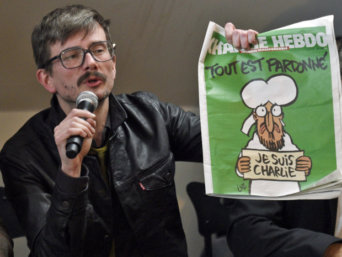- About
- Topics
- Picks
- Audio
- Story
- In-Depth
- Opinion
- News
- Donate
- Signup for our newsletterOur Editors' Best Picks.Send
Read, Debate: Engage.
It's the issue of Charlie Hebdo after the carnage. Putting the political implications and interpretations aside, it's difficult to imagine under which conditions the staff, mourning for their friends and colleagues, must have edited this issue.
Considering both, a nation under shock, and the reflecting shockwaves around the globe, the burden in political means must have been tremendous. Charlie has chosen an approach that doesn't necessarily express a political opinion, but reduces to the essence of what human beings might be about: to feel, to laugh, to cry.
On Tuesday, January 13th, Charlie Hebdo cartoonist Renald Luzier, aka Luz, explains the magazine's latest front page which features an image of the prophet Muhammad crying. Luzier, who drew the image, says it 'wasn't the front page that the terrorists wanted us to do', but was what the staff felt was right. The headline for the image reads: 'All is forgiven'. This is what he said:
"We are all cartoonists who like to draw little characters, just like when we were kids, and by the way, the people, the terrorists, they once were children, they did drawings too, like us, like every child. So at some point they lost their sense of humor, they lost their child soul which allows people to see the world from a distance because that's what Charlie is about, to look at the world with a bit of distance. Then there was nothing else but that for the cover idea, this idea of drawing Muhammad, I am Charlie. And I looked at him, he was crying, and over it I wrote: 'All is forgiven'. I cried, and it was the front page. We had found the front page, we had at last found this damned front page, and it was our front page, not the one the world wanted us to do, but the one we wanted to do. It wasn't the front page the terrorists wanted us to do, because there isn't a terrorist in there, there is just a man crying, a character crying, it's Muhammad. I'm sorry, we drew him again, but the Muhammad we drew is a man crying above all."
If you read Charlie this way, it's all about the question how we begin our lives as children, and how we end it up as human beings in this world. A questions that certainly applies towards the terrorist, but surely not only towards them.
